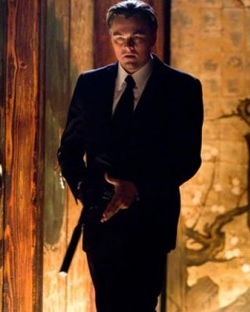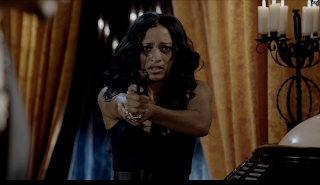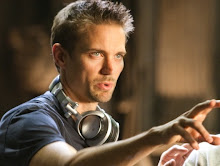HUGE SPOILERS. DO NOT READ IF YOU HAVEN'T SEEN THE MOVIE.

In my previous blog I theorized Cobb was doing an elaborate Inception on himself so that he could convince himself to believe that his dream was actually his reality.
Since then I’ve heard a few other theories and I watched the movie again. I found it even more enjoyable to watch things unfold masterfully, and I even got caught up in the emotional story this time as I was able to shut my left brain down a bit to feel what was actually going on.
As much as I wish I had the answer, I actually only have a strong suggestion but a couple other possibilities.
I’m going to put all theories that Cobb is living in a reality aside as I don’t find that plausible. I’ve heard the idea that Cobb is dreaming while on the plane home to see his kids (reality), and I’ve also heard that Cobb at the palace at the beginning with Saito is his actual reality. Well, why not just say they’re both true: Cobb was on a plane home to see his kids when it crashed and he was washed up on shore where he ran into Saito, etc. I’m going to skip these…
And I’m going to accept that the entire movie is Cobb’s perception, and that someone is doing an Inception on him. The question is who…?
Before getting to that, lets discuss the 6 levels of this movie.
Level 1- The real reality
Level 2- Cobb’s supposed reality.
Level 3- Yusuf’s Van Dream
Level 4- Arthur’s Hotel Dream
Level 5- Eames Snow Fortress Dream
Level 6- Limbo
 Level 1 is the reality we never see; since the entire movie, as I mentioned, is Cobb’s dreamed perception (starting at level 2), the first level is where the real answer lies.
Level 1 is the reality we never see; since the entire movie, as I mentioned, is Cobb’s dreamed perception (starting at level 2), the first level is where the real answer lies.
 Level 2 is what Cobb perceives as his reality. This is where he spins his totem to “check his reality”. He wears a wedding ring only when he’s in this level. I argue that these perceived rules are placed in his mind as part of his inception. There are specific clues that tell you this is not real. For instance, the agents that chase him down in Mombasa; aren’t these just his subconscious turning on him?
Level 2 is what Cobb perceives as his reality. This is where he spins his totem to “check his reality”. He wears a wedding ring only when he’s in this level. I argue that these perceived rules are placed in his mind as part of his inception. There are specific clues that tell you this is not real. For instance, the agents that chase him down in Mombasa; aren’t these just his subconscious turning on him?


 Levels 3-5 are clearly part of Fischer’s inception, the red herring, and yet, the parallel of the entire operation being done on Cobb.
Levels 3-5 are clearly part of Fischer’s inception, the red herring, and yet, the parallel of the entire operation being done on Cobb.
 Level 6- also known as Limbo, this is a very complex place that some don’t even think should be considered a level of dream-state, but more as a state of mind, as anyone can access Limbo from different states (as Saito, Mal, Cobb, Fischer, and Ariadne all get there in different ways).
Level 6- also known as Limbo, this is a very complex place that some don’t even think should be considered a level of dream-state, but more as a state of mind, as anyone can access Limbo from different states (as Saito, Mal, Cobb, Fischer, and Ariadne all get there in different ways).
Let me back-track to the Fischer/Cobb parallel, because I think that’s key to understanding this whole deal. The way I understand it is there are three levels to performing an Inception on someone. These are the steps and how they relate to a) Fischer and b) Cobb.
1) this is basically the setup. Establishing the problem. Planting the seeds.
a. Fischer: Realizes people are trying to steal a code of some sort that leads to the will of his wealthy dying father, who apparently was “disappointed” in his son, causing animosity between them.
b. Cobb: Since he experimented with extraction on his wife, Mal, she was convinced her dream was a reality. He had to perform an Inception on her to get her to believe she was dreaming so she’ll kill herself and return to the real world. After that, she ended up never believing life was real and she actually kills herself. Not only that, but to get him to join her she tells him that she’s convinced authorities that she didn’t feel safe around him- as blackmail to get him to join in both killing themselves so they could finally jump back into reality and be with their kids. Cobb has a lot of guilt to bear.
2) This is creating a moment that will put the impetus in the subject to want to find the answer to their problem.
a. Fischer: After he is convinced that he is in a dream and accepting that people are trying to do an extraction on him, Fischer is then led to Browning who admits he was the one who betrayed him. Now Fischer is convinced the only way to protect himself is to go into his own subconscious to find out the truth about his father (even though he’s really going into Eames’ dream).
b. Cobb: I could actually argue that there are two possible moments here…
i. Saito proposes to Cobb that he can make one phone call and Cobb will be released of all charges and be able to go home to his children. So now Cobb believes that if he performs an Inception on Fischer he’ll be redeemed, but the experience (levels 3-5) will actually be positioning Cobb in just the right way to accept his own Inception.
ii. When Cobb is with his wife at the end, he says that he’ll come back for her if she lets Fischer go.
3) The Inception: This is the final event that makes the subject/victim believe they should take an action of their own accord.
a. Fischer: When he sees his father in the hospital bed, dying, saying that he was “disappointed that Fischer wanted to be like him” Fischer then realizes that his father actually loved him. He opens the safe not to see the will but to see a symbol of his childhood, thus making Fischer let go of the notion that he needed to hang on to his father’s company to please him. As we see Fischer lay out to Browning/Eames on the shore (after the van sinks) what he plans to do, so shall Cobb learn the positive action to take with his Inception.
b. Cobb: Seeing his children’s faces for the first time, he’s succeeded in finding “reality” again. So theoretically if he wakes up then he can accept the passing of his wife and live happily ever after with his children.
We watched Cobb drop the sedative in Fischer’s drink on the plane, bringing him into the first (or 3rd) level, but we don’t know who put Cobb under, leading him to his first (or 2nd) level dream-state.
Who would do this to Cobb- and why?
There are four possibilities that, if the movie truly represents Cobb’s perspective, could never be fully explained by the movie because then the theoretical inception on Cobb would never have worked. I’ll categorize these possibilities by the potential motivators.

Cobb: This was my original theory. I now think this is the most “poetic” answer but not necessarily the most likely. However, here’s one thing that makes me think its still a possibility.
In an inception there is a subject and there is a dreamer. If we’re accepting the idea that an inception is being performed on Cobb then that makes him the victim- or the subject- of the dream, as he populates the world according to what makes sense to him. The dreamer is the “leader” of the dream, oftentimes the architect but not always.
The important element being that when the subject feels like they’re not in their own reality then their subconscious starts attacking the dreamer (just as Cobb’s subconscious attacks Ariadne when he explains the rules to her in the beginning).
So when Cobb is in Mombasa talking to Eames he is attacked by “faceless agents” (as described by Mal). So this means that Cobb is the subject and the dreamer.
Its possible my original instinct that Cobb is performing an Inception on himself was correct but lets assume another possibility.

Saito: This was also part of my original conceit. I thought Saito was performing an Inception on Cobb to get him to do the Fischer job for him. This alone is not satisfying enough, which is why I thought Cobb might be tricking himself into believing Saito was performing an Inception on him.
Ultimately, I think Saito is an element to the Inception on Cobb, which I gathered was what Cobb discovers in the temple and on the plane when he sees Saito at the end. But just as…
…Fischer thought Browning was doing an extraction on him when it was really Cobb doing the Inception…
…so it seems with Saito doing an Inception on Cobb when it was really…

Ariadne: In the beginning when Cobb is explaining the rules to Ariadne he says “You’re the dreamer and I’m the subject (victim).” How true this might be?
In the famous myth, Ariadne guides Theseus through the maze, just as the movie’s Ariadne does with Cobb. She shows a natural ability that suggests there’s more to her than meets the eye. She’s constantly reminding him that Mal is a dream throughout the entire movie, trying to get Cobb to shoot her and get on with his life. My friend, Jason, theorized that Ariadne shooting Mal at the end is the inception; but I don’t think its satisfying enough to have someone else execute the step that Cobb should be taking on his own. And the inception moment needs to be a positive experience, which is why Fischer’s Inception is the moment with his father, and Cobb’s Inception is the final scene with his kids.
Even though I don’t think Ariadne shooting Mal is the moment of Cobb’s Inception, I still believe Ariadne is the one executing and guiding the Inception.
The only problem is Who is she in reality? What motive does she have? We don’t know the real reality (Level 1) since we’ve never seen it, but I’d think if she had a meaningful motive then Cobb would recognize her when he first meets her.
So while I do believe it was Ariadne performing the Inception, I find it hard to believe that she was the one who orchestrated it.

Miles: This is the most likely scenario. As Cobb’s father-in-law, he might feel the need to aid Cobb in moving on with his life without Mal for the children’s sake. Or maybe he wasn’t sure how Mal actually died and he needed to do an extraction on Cobb to find out the truth; then, once Miles realized she killed herself, he turned it into an Inception to get Cobb to move on from her death.
Since its suggested that Miles is a bit of an expert in the extraction field- as he’s the one who “taught Cobb everything he knows”- I would go a step further and suggest the possibility that Miles is a “forger”- like Eames. Since he appears very little himself throughout the Inception, lets pick out a couple people in the film whom he could be posing as…
a) There’s the Kenyan chemist in Mombasa who Yusuf leads the group to who has that super-sedative he uses to put people in a deep dream-like state. He even says to Cobb in is yoda-like way something about how people come here to finally wake up; hinting at Cobb’s endgame.
b) Then there’s Saito, who certainly plays an integral part in all this, also positioning Cobb’s mind to accept the Inception with the whole “growing old” and dying alone” warning. And it makes sense that Saito’s the only one you don’t see get off the plane, so Miles could be embodying both of them. Also, Saito represents the one man who can allow Cobb to finally get home to see his children.
c) I wonder if Miles could even be Eames. They’re both in the airport together but I don’t think they share the screen.
Miles seems to have a strong motive- so Cobb can get over the death of his wife and take care of the kids. But lets look at one more scenario of who could be performing an Inception on Cobb…

Mal: What if, as she says to Cobb in their dream, that he’s really the one dreaming and she’s awake. “Why do you think faceless agents are trying to kill you?” “Wake up and come back to me and the children.”
Her first attempt to convince him seems to fail; it appears the only way to get him back is if she can convince him that she’s the deluded one. And so she sets up this whole world, establishing rules, convincing him the second level is his reality when its really a dream. They make it clear in the movie that the Spinner is actually her totem, so it seems that his wedding ring may be his actual totem. But again, it almost doesn’t matter because it’s a device used to get Cobb to distinguish when he’s in a supposed reality vs a dream.
And so down the rabbit hole he goes, trying to convince Mal to come back to reality. She even appears in his other dreams, trying to ruin them and kill the subjects (interestingly enough, Mal means “Bad”). Then she kills herself, and the only way he can get back home is if he does this last job for Saito. Each level Cobb is gaining a little more clarity, just as Fischer does with his inception.
So this suggests that Mal was never dead. But why is she doing this? What motive does she have?
Is it that Cobb’s stuck in a dream- the reverse of what Cobb thinks of Mal?
Or is Mal’s Inception on Cobb simply a warning? If he goes too deep into experimenting with dream-states then he’ll never be able to live in reality. And the theme of the movie becomes Don’t live in the past or future; live in the now. If the movie continued or there was a sequel, Cobb could wake up and appreciate his family- and stop this whole Extraction business.
While I think the Miles scenario is the most likely, there is no way of knowing this final layer because we are kept from the true Level 1, Cobb’s actual reality.
He could wake up and any of the above scenarios could be justified. There are even many other BS scenarios where the Inception is being performed by Eames, or Yusuf, or Arthur, but I don’t think Nolan would cheat by choosing arbitrarily.
I’m always reluctant to pick a favorite movie of the year, but this was so masterfully done, from the writing, to the acting, the score, effects, etc. If there’s any inception that has been done with this movie its gotta be in the minds of the Academy voters for Best Original Screenplay, at the very least! Although since Dark Knight was kept from getting a nomination for Best Picture a couple years, its possible that snooty voters who are too above this movie will try and snub it as well.
I appreciate that Nolan has opened the door for psychological thrillers mixing with mainstream genres, but I dread all the copycats that are soon to come out that will pale in comparison.
~ JW





